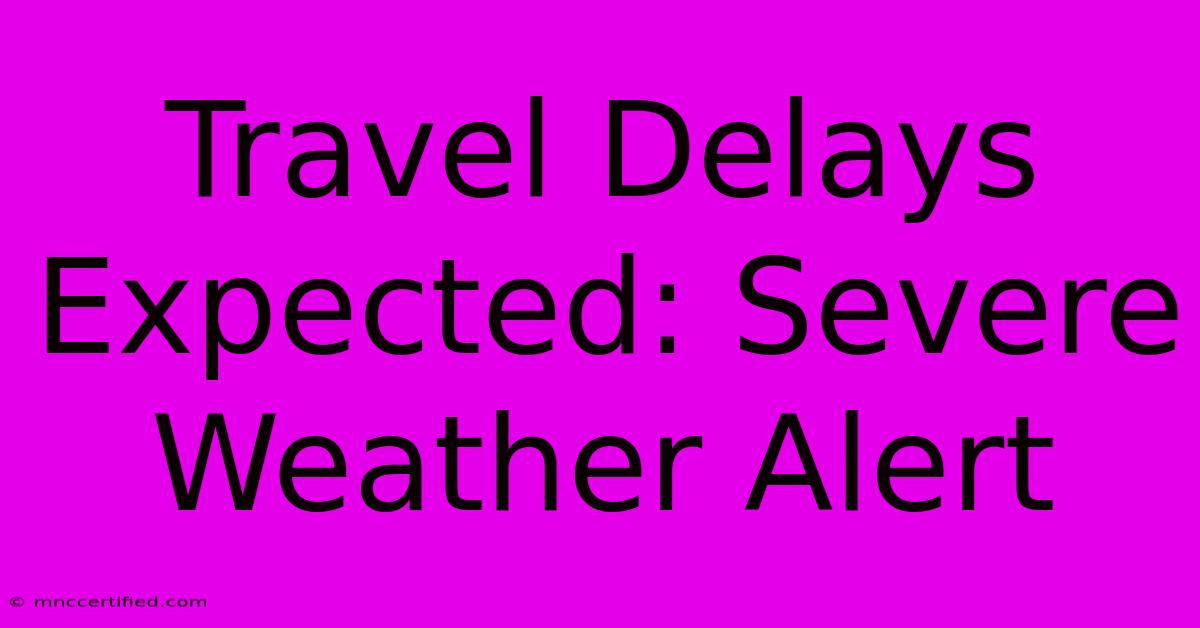Travel Delays Expected: Severe Weather Alert

Table of Contents
Travel Delays Expected: Severe Weather Alert
Severe weather is impacting travel across [mention specific region/country]. Airlines, train companies, and road networks are experiencing significant disruptions. This article provides crucial information and advice for travelers facing potential delays.
Understanding the Severity
Current weather conditions: [Clearly state the type of severe weather – e.g., blizzard, hurricane, heavy snowfall, flooding]. Wind speeds are reaching [speed] mph/kmh with [visibility conditions]. [Mention specific areas most severely affected]. This extreme weather presents significant challenges for safe and efficient transportation.
Impact on transportation: [Specify affected modes of transportation – e.g., flights, trains, buses, roads]. Numerous delays and cancellations are already reported. [Mention specific airports, train stations, or highways experiencing major disruptions]. Check with your specific carrier for the most up-to-date information.
Before You Travel: Proactive Measures
- Check weather forecasts: Before embarking on your journey, meticulously check the weather forecast for your origin and destination. Utilize reputable sources like [mention specific meteorological sources, e.g., AccuWeather, The Weather Channel, national meteorological service].
- Confirm your travel arrangements: Contact your airline, train company, or bus service provider to confirm your booking and inquire about any potential delays or cancellations. Don't rely solely on automated systems; a phone call might offer more detailed information.
- Pack appropriately: Pack for all weather eventualities. This includes extra layers of warm clothing if dealing with cold weather, rain gear for storms, and appropriate footwear for snowy or icy conditions.
- Charge your devices: Ensure all your electronic devices (phone, tablet, laptop) are fully charged. Having access to communication is crucial during travel disruptions.
- Inform someone of your travel plans: Let a friend or family member know your itinerary, including flight/train numbers and expected arrival times. This allows someone to monitor your journey and assist if necessary.
During Travel Delays: Staying Safe and Informed
- Stay updated: Continuously monitor weather reports and updates from your transportation provider. Many airlines and train companies utilize social media for real-time updates. Follow their official accounts.
- Follow instructions: Pay close attention to announcements from airport/station staff or transportation personnel. They will provide guidance on safety measures and alternative arrangements.
- Be patient and understanding: Delays are frustrating, but remember that staff are working hard to manage the situation. Maintaining composure will help you navigate the challenges more effectively.
- Seek shelter: If you're caught in severe weather conditions, seek immediate shelter. Find a safe, indoor location until the storm passes.
- Contact your accommodation: If your delay affects your check-in time, contact your hotel or accommodation provider to inform them of the situation.
After the Delay: Claiming Compensation and Rebooking
- Check your travel insurance: Review your travel insurance policy to understand your coverage in case of delays or cancellations. Many policies offer compensation for such disruptions.
- Contact your provider: Contact your airline, train company, or bus service to inquire about rebooking options and potential compensation for missed connections or inconveniences.
- Keep all documentation: Maintain records of all communication, including emails, flight/train confirmation numbers, and any receipts for expenses incurred due to the delay.
Keywords for SEO Optimization:
- Travel delays
- Severe weather
- Weather alert
- Flight cancellations
- Train delays
- Transportation disruptions
- [Specific weather type, e.g., blizzard, hurricane]
- Travel insurance
- Compensation claims
- Airport delays
- [Specific airport codes]
- [Specific train lines]
Note: This article is for informational purposes only. Always refer to official sources for the most up-to-date and accurate information regarding travel disruptions. Remember to adapt the bracketed information to reflect the specific situation you're writing about. Using location-specific keywords will improve local SEO.

Thank you for visiting our website wich cover about Travel Delays Expected: Severe Weather Alert. We hope the information provided has been useful to you. Feel free to contact us if you have any questions or need further assistance. See you next time and dont miss to bookmark.
Featured Posts
-
Liontrust System Enhanced Black Rock Bny
Nov 23, 2024
-
A Thanksgiving Reflection
Nov 23, 2024
-
How Long Does Composite Bonding
Nov 23, 2024
-
Star Wars 1977 Trading Cards Value
Nov 23, 2024
-
Reece James Injury Update Chelseas Anxiety
Nov 23, 2024